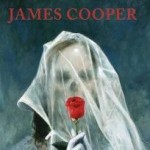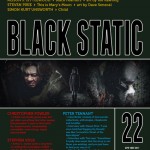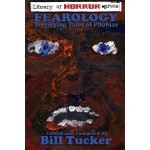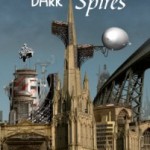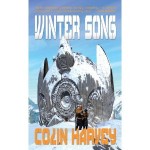
Cover by Ben Baldwin
Apologies for the delay – in almost four years, this is the first time the review has been quite this late….
Black Static for February / March 2011 sees the usual strong mix of returning regulars and talented neophytes, but this issue it the non-fiction that stands out especially, starting with genre news in White Noise, which details several new releases from Steven Pirie, Tim Lees and others.
Electric Darkness by Stephen Volk
In which Volk dresses as Father Christmas and puts the boot in to Bath City’s most famous supporter, who is almost a national treasure in some quarters.
Stand up, Mike Leigh. I’ve had enough of all your actors thinking that a speech impediment and ill-considered wardrobe is a substitute for characterization. I’m pissed off at hearing them going on and on endlessly about your “method” when the result of it seems to be the same deeply irritating whine. (It should have a verb: to blethyn)… Leigh sends out actors to observe and report. But writing isn’t just observing and reporting. It’s about imagining.
Volk’s irritation is with those in the arts who elevate realism above the imaginary. All writers create secondary worlds, but in the case of Leigh and other ‘realists’ they limit their imaginations and substitute our primary world as a crutch, and then use this limited approach to validate their work.
Night’s Plutonian Shore by Mike O’Driscoll
In ‘The Genre Fallacy’ O’Driscoll issues a counterblast to what was largely a pompous, dim-witted and self-serving denigration of genre fiction, notably a shoddy attempt to publicize his new novel by Booker finalist Edward Docx in The Guardian.
O’Driscoll correctly identifies that ‘literary fiction’ is as much a genre as any other, and makes the point that constraining through the conventions of genre can actually result in a greater work than otherwise would be the case.
Interference by Christopher Fowler
In the last of the comment columns, Fowler calls for a grass-roots movement to supplant the current crop of Hollywood no-brainers (How did Yogi Bear and The Three Stooges ever get green-lit?).
Fiction
V.H. Leslie opens the fiction with a first sale that bodes well for the future. Daniel and his expectant partner Robyn are converting an isolated baron the edge of the woods. Robyn decorates the nursery with wallpaper that as the story progresses, Daniel finds more and more disturbing.
‘Ulterior Design’ starts with a close focus on the couple, only gradually panning out to reveal more and more of the setting, which becomes increasingly claustrophobic. Its nightmarishly fairytale feel works well until the slightly telegraphed and rather conventional ending, but perhaps any feeling of slight anticlimax is more a reflection on how good the first half is.
The art by Paul Milne would overwhelm most stories, but Leslie’s imagery is so powerful that it actually complements it. Highly Recommended.
Ray Cluley
Ray Cluley appears in a second consecutive issue with ‘Pins and Needles’ in which James, a young man profoundly obsessed with space passes his days by putting pins, razor blades, even knitting needles in places where the unwary will impale themselves.
Because it’s the only way to make you feel something. Because sometimes the hurt is good, it helps, and eventually you can get used to the bad part, the pain, if everything’s all better afterwards. Just a quick pain, a nip, just a bit of a sting, that’s all. Then gone. All better.
For a brief while Cluley offers both James and the reader hope, in the shape of Angela, a kindly, carnal dental nurse, but it’s obvious that James is just too strange, and when the ending comes it’s both laugh-out-loud funny and poignant, which may be a first. Outstanding. (And it has great artwork by Rik Rawling as well)
Maura McHugh’s ‘Water’ is short but strange.
Watery references recur in Ed Grabianowski’s ‘Extraneous Invokat,’ in which a young couple about to move home become prey to disturbing visions and other unpleasant phenomena. The artwork is by Dan Henk.
James Cooper
James Cooper’s ‘Cushing’ concludes the fiction, with an illustration by Ben Baldwin that provides the basis for the cover. Two brothers whose father has committed suicide live with their widowed mother, who spends her days painting and sketching her elder son, while she all but ignores the younger one. This is only slightly disturbing, but Cooper heightens the sense of ‘wrongness’ with one delicate touch: in all the pictures, elder brother David’s face has been cut out, and replaced with that of Peter Cushing. With a commendable sense of restraint, Cooper creates a tension between what is stated and that left unstated, leaving the reader space to think. Outstanding.
Reviews
The magazine concludes with Peter Tennant’s Case Notes (book reviews), which this time -in honour of Women in Horror Recognition Month- focuses on women writers; an interview with Australian horror writer Angela Slatter, and reviews of her three collections. Plus Amelia Beamer’s The Loving Dead, anthology Rigor Amortis, Allyson Bird’s Wine and Rank Poison (her follow-up collection to Bull Running for Girls) and many more. Tony Lee’s Blood Spectrum (DVD/Blu-ray reviews) profiles the remake of I Spit on Your Grave and A Serbian Film, amongst others.
Perhaps the best way to sum the issue up is with a quote from Ellen Datlow: The most consistently excellent horror magazine published. Indeed, and Bs21 continues to maintain this consistency.
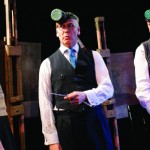 theatre.
theatre.